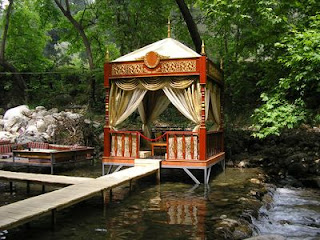To us the word 'kiosk' represents a small structure where newspapers are sold. The word came into English from the Turkish 'köshk', meaning 'pavilion'. In the heat of summer it was more pleasant to spend as much time as possible in the open air. The kiosks were made of wooden slats and could be as simple or as ornamental as wished.
In many cafés in the south west of Turkey you can choose between a table and chairs or a kiosk. Taking tea in a kiosk is a lengthy and relaxing business. The cushioned benches are so tempting you may well have a little siesta before you can find it in your heart to get up and leave. Under the wooden roof of your temporary home with its decorative slatted rails, you can lie and watch the poplar branches sway gently in the breeze against the vivid blue sky.
As I love this element of Turkish life, it was inevitable that a kiosk would appear in my story, April and May, set in Constantinople. Of course it is not just an agreeable place to sit during the heat of midday but the only safe place for conversations about planning great political changes. It is in the kiosk, too far away for any prying ears to make out what is said, that His Excellency, Kerim Pasha, can discuss the proposed vital military reforms with Tom Hawkesleigh.
There is a kiosk on the cover of April and May, although a more ornate one, reminiscent of the harem kiosk at Top Kapi Palace.

